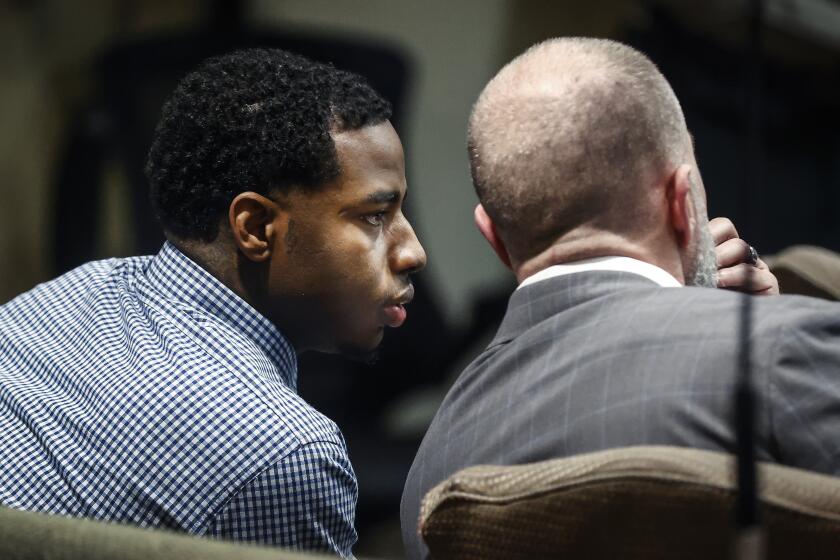Broadway likes moneymakers, but serious art gets the accolades
Broadway’s record box office this year may have been driven largely by previous seasons’ blockbusters, but art trounced commerce at Sunday’s Tony Awards.
As expected, the top prizes went to “The Coast of Utopia,” Tom Stoppard’s three-part, nearly nine-hour epic about radical 19th century Russian intellectuals, and “Spring Awakening,” Duncan Sheik and Steven Sater’s musical adaptation of German playwright Frank Wedekind’s expressionistic tale about societal repression and adolescent sexuality.
In the best revival categories, “Journey’s End,” R.C. Sherriff’s musty yet still powerful expose of life and death in the World War I trenches, won for drama, and “Company,” George Furth and Stephen Sondheim’s unsentimental look at marriage and monogamy through the eyes of an inveterate bachelor, picked up the prize for musical.
The message: Fluff might sell, but seriousness (sorry, “Legally Blonde”) is what the theater community stands by. Now if only art and commerce could join hands and turn out a show that’s simultaneously -- and unqualifiedly -- a critical and popular hit. Then we’d all be smiling at revenue numbers that, despite their steady climb toward the billion-dollar mark, can’t conceal such darker realities as a slew of multimillion-dollar flops (including “High Fidelity,” “Coram Boy” and the soon-to-be shuttered “The Pirate Queen”) and exorbitant ticket prices that have rendered Broadway a luxury item for the Zagat set.
No wonder producers are so eager for marquees to flaunt big-name Hollywood stars and movie titles from the Disney chain and the high-grossing non-animated world beyond. Even those Broadway browsers with money to burn want a little assurance that their dollars are going to purchase a few hours of fun. And in the theater, familiarity clearly breeds confidence more than contempt in prospective consumers.
Which is why we should all be pleased to hear that “Spring Awakening” has gained momentum at the box office after an uncertain start. Obviously, this critically acclaimed indie musical, which began off-Broadway, is unlikely ever to be another “Wicked” or “Jersey Boys,” but the signs are good that it will earn a healthy-enough return to encourage producers to keep taking risks on fresh vision.
At the same time, we shouldn’t kid ourselves that “Spring Awakening” and “Grey Gardens,” the other envelope-pushing best musical nominee, represent new high-water marks. Neither score is one for the ages, and both have choppy books that require some overlooking -- even though “Spring Awakening” took home the awards in both categories. Taken as a whole, they’re imperfect shows, yet their overall willingness to stretch the art form in novel, unsentimental directions couldn’t be more prized at a time when jukebox and movie retreads are still holding sway.
What’s more, both productions are pulled off with astonishing adroitness. Michael Mayer, who deservedly won for his staging of “Spring Awakening,” seamlessly coordinated his youthful ensemble with a crack design team and Bill T. Jones’ extraordinarily understated Tony-winning choreography. And “Grey Gardens” boasts not just one but two phenomenal performances -- by Tony winners Christine Ebersole and Mary Louise Wilson -- that will be savored long after their grandly ramshackle set has been torn down.
Once again, it was a year in which actors provided the most lasting memories. If Ebersole’s was, hands down, the tour de force among them, there were at least half a dozen others that made Broadway theatergoing the luminous experience it’s supposed to be.
Frank Langella’s presidential turn in Peter Morgan’s “Frost/Nixon” was the winner in a category so overstocked with talent that there was no room for Bill Nighy’s dexterous portrayal in David Hare’s otherwise disappointing play “The Vertical Hour.”
David Hyde Pierce, in a role affording him a gleeful outlet for his love of theater as the show-fixing detective in the Ahmanson-launched “Curtains,” took the best actor in a musical award in a mild upset over Raul Esparza, who plays commitment-phobe Bobby in “Company,” a work that wears its jaundiced outlook on its sleeve.
Under the brilliant direction of Tony winner Jack O’Brien, “The Coast of Utopia” virtually cornered the market on a generation of dashing male talent that included Ethan Hawke, Brian F. O’Byrne and Billy Crudup (a winner for featured actor). One notable absence was Liev Schreiber, who has been otherwise occupied catching shock-jock fire in the revival of “Talk Radio.”
Julie White won for best actress in Douglas Carter Beane’s “The Little Dog Laughed,” though it was the one relatively weak acting category this year despite the presence of the evergreen Angela Lansbury, Vanessa Redgrave, Swoosie Kurtz, all of whom have won before, and Olivier-winning actress Eve Best.
One could kick and scream about a season in which an English writer delivered the best play winner on the heels of last year’s victory by Alan Bennett’s “The History Boys.” But then Stoppard may very well be back in 12 months to claim another trophy for “Rock ‘N’ Roll,” a less intellectually sprawling though equally expansive -- and even more emotionally resonant -- drama that opens in the fall.
There’s no arguing with success, as Morgan perhaps knows better than anybody, having been recently celebrated for his movie “The Queen” and enjoying one of the rarities of all rarities in the commercial theater -- a straight play that makes a profit from material as unsexy as the Frost-Nixon interviews.
And how can one not salute the producers of “Radio Golf,” August Wilson’s final installment of his 10-play cycle chronicling the 20th century African American experience? The play, which was completed just before the playwright’s death, may not rank as Wilson’s finest, but it deserves its Broadway showcase, killingly expensive though it may be.
Money still makes the Great White Way go round, but let’s bask a moment in a night paying homage to nobler impulses.
More to Read
The biggest entertainment stories
Get our big stories about Hollywood, film, television, music, arts, culture and more right in your inbox as soon as they publish.
You may occasionally receive promotional content from the Los Angeles Times.











